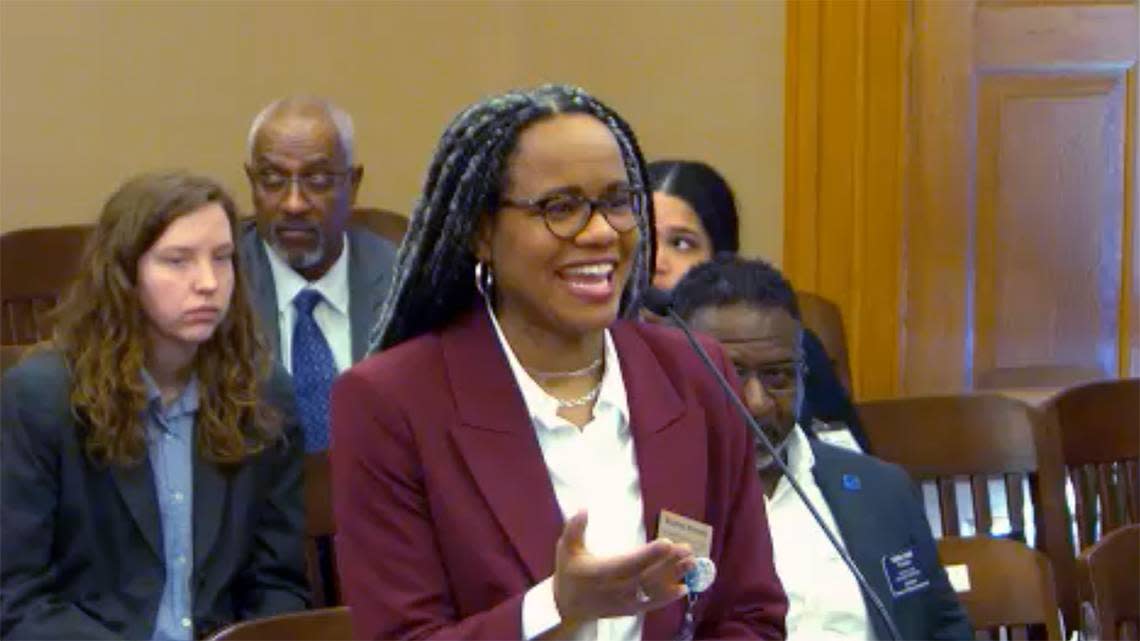Question to Kansas Senate: What if you were forced to curl your straight hair at work? | Opinion

- Oops!Something went wrong.Please try again later.
I can “hear” some of you rolling your eyes. “She’s writing about natural hair, again.”
Yes, I am, but Kansans have a good reason to read this. And Missourians, well, you’ll either keep your eyes on this in the hope that change will come, or not.
Via a virtual stream Thursday, I watched the Kansas Senate Committee on Federal and State Affairs discuss Senate Bill 36 — natural hair as a part of discrimination through ancestry — in Topeka during the first week of the legislative session.
Missouri has no such law.
What is S.B. 36? Is it the same thing as the CROWN Act, which has been passed in Lawrence, Wichita and Atchison? This new legislation would amend the existing 1953 Kansas Act Against Discrimination by adding “ancestry” and “protective hairstyles” to its list of terms that prohibit unjust treatment.
Speakers for the bill, such as Shirley’s Kitchen Cabinet founder Michele Watley, pointed out that race, on its own, does not include hair as a protected characteristic, and so the act must be amended.
Star Opinion writers, myself included, have written about the importance of letting people wear their hair as they like at school and in the workplace. I’ve published a book with hair narratives. Hair is a personal part of our bodies, a personal choice, and should not be prescribed by employers, schools, public or private agencies.
A fiscal note attached to the bill, signed by Kansas Budget Director Adam Proffitt, explains: “‘Ancestry’ would be defined as inclusive traits historically associated with a person’s ancestry, including, but not limited to, hair texture and protective hairstyles. ‘Protective hairstyles’ would include but would not be limited to hairstyles such as braids, locs and twists.”
Not creating new class, just clarifying ancestry
The commission has 15 bills in committee and other resolutions to consider for the session, so members naturally had many questions on whether the amendment is necessary.
State Sen. Mike Thompson, committee chair, asked and took questions on whether S.B. 36 would affect workplace occupational safety or health policies. No, it wouldn’t. People could cover or put up their hair to comply with those policies.
Thompson also wondered how far the bill could go. Could someone with green hair claim protections? Jason Long of the Kansas Office of Revisor of Statutes was clear in the implications: “We are not introducing a new class but just clarifying the ancestry.” So unless green hair is in your ancestry, it would not be part of a protected class.
State Rep. Stephanie Clayton of the 19th District came forward as the chief carrier of the act on the House side. Clayton said she sees the Senate bill as primarily a concern in the workforce.
“Putting this in place does make it easier from a workforce issue,” She said. “If it is no longer up for discussion,” it would protect employees and allow them to wear their hair in a way natural to them.
Clayton, a white woman, gave an interesting argument.
“Let’s turn it around on its head,” she said. “I have incredibly straight hair. It will never curl.” She went on to wonder what if societal expectations forced her to make it curl? Fortunately, she said, her natural hair does not defy current beauty standards.
“I look at removing that bizarre and outdated expectation.”
In and near the Kansas City area, we’ve seen discrimination by hair mostly against young people. For example:
An Ottawa teenager was kicked off the cheer squad for wearing long braids.
Another teen in south Kansas City was refused a job because of his dreadlocks.
Student-athletes have alleged bias because of their hairstyles at Highland Community College.
Fear, frustration, if not outright discrimination
Ruth Glover is the executive director of the Kansas Human Rights Commission, the agency that administers the existing discrimination law. She was neutral on the bill because of those very concerns from young people.
“We are not a resource when schoolchildren are involved,” she said. “Public accommodations do not include schools. … We refer (complaints) to the U.S. Department of Education, Office of Civil Rights.”
She suggested the committee take a look at the state’s bullying statute to ensure proper coverage.
But several proponents of the amendment who appeared before the commission said there are plenty of other examples of fear and frustration in the workplace, if not outright discrimination. Several Black women wearing their hair in various styles, including Watley, Lawrence City Commissioner Amber Sellers, Kansas African American Affairs Commission Executive Director Stacey Knoell and others spoke on their hair journey of searching for authenticity and being accepted in the workplace and society.
State Rep. Ford Carr of the 84th District, who is African American, recalled how he wore his hair in “straight backs” (also called French braids) in the last session, and thanked his colleagues, “because not one of you said anything. It wasn’t discussed in this body. I would ask that we simply expect the rest of the state to have the same courtesies in this body.”
Carr’s plea was right at home, and I agree. If the legislative body can treat his hair choice with courtesy, all people deserve that same treatment.
I encourage the committee to take the necessary steps to make the amendment stick. And maybe, when Missouri does the same, I won’t ever have to write about hair again.

